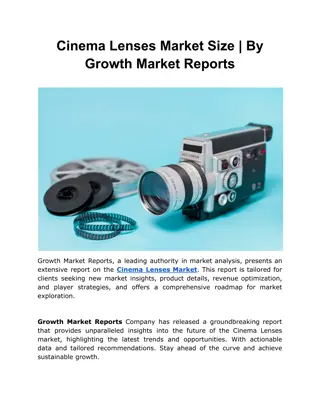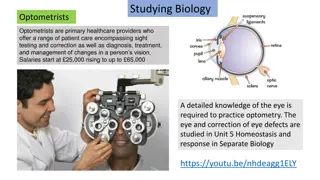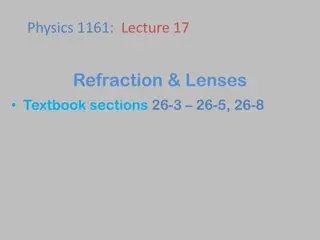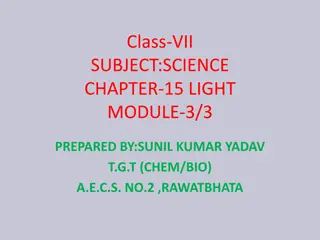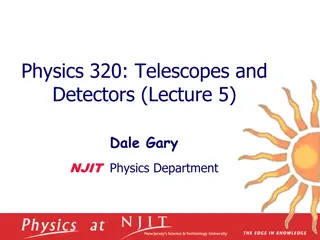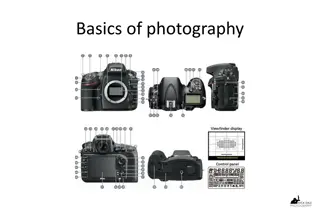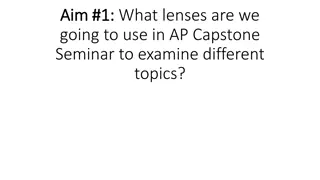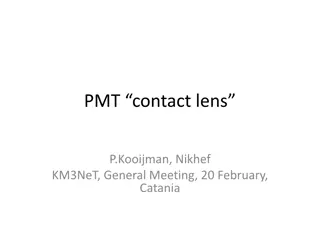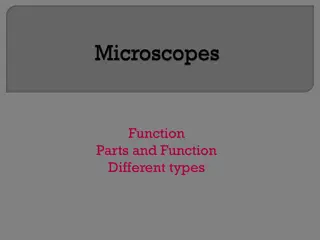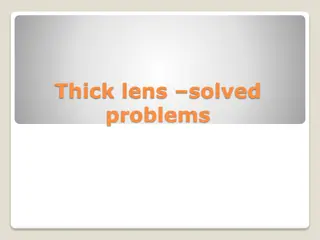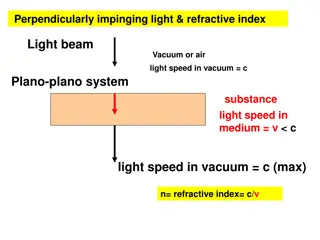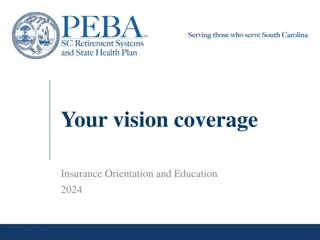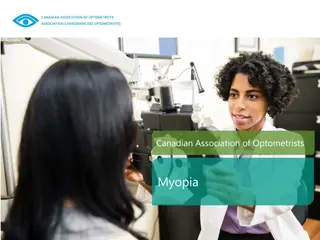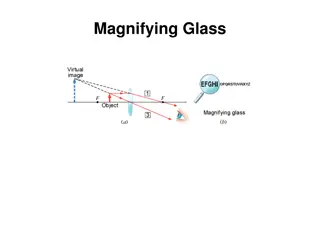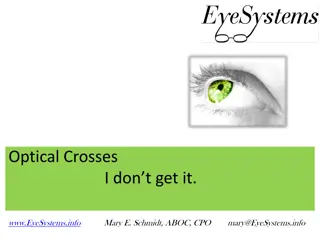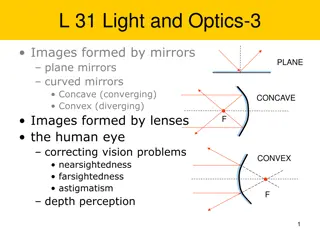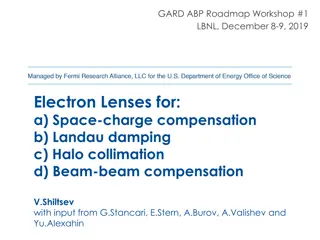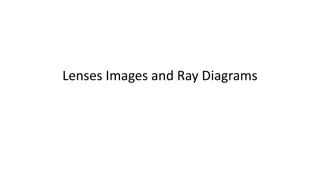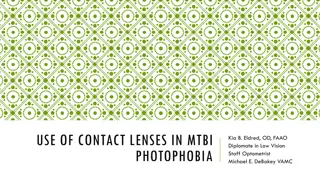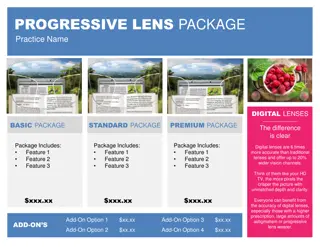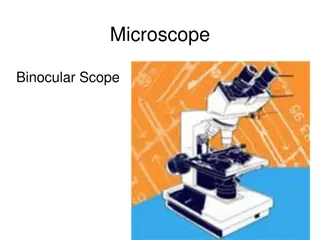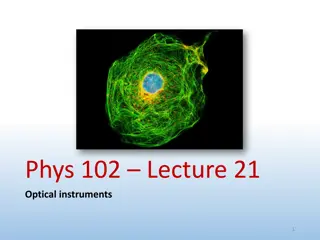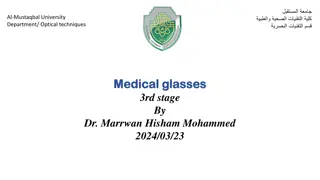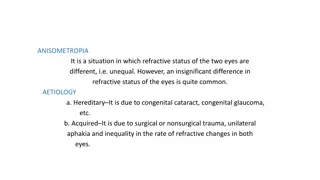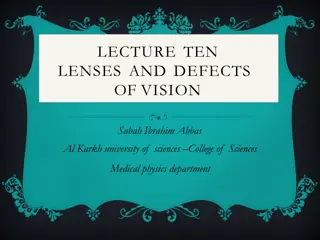Creating 360 Degree Videos with Insta360
Dive into the core concepts of Insta360 One R hardware and software, exploring features like lenses, functions, discretion, and photography settings. Learn how to utilize manual settings for both indoor and outdoor environments, along with basic tips for optimal use. Enhance your knowledge of 360-de
3 views • 46 slides
The Impact of Word Choice on Communication
Explore the complexities of word choice and its influence on communication through various lenses such as personal experiences, cultural contexts, and generational differences. Delve into the nuances of language and how selecting the right words can enhance understanding and build connections in div
0 views • 11 slides
Exploring the Fascinating World of Hydrogels and Polymers
Dive into the realm of hydrogels and polymers, discovering their unique properties and versatile applications in everyday life and medicine. Learn how to create hydrogels using the chelation process and explore the science behind these water-loving materials. From contact lenses to knee surgery inno
0 views • 16 slides
Contemporary Representations of Christmas Theology in Art
Explore how three artists, Antonia Rolls, Kristoffer Ardena, and Fernando Ariziti, depict the theology of Christmas in their artwork. From the 4am Madonna by Rolls to The Meaning of Christmas by Ardena and Incarnation by Ariziti, delve into the diverse interpretations and reflections of the Christma
0 views • 4 slides
Best Progressive Lenses in Alexandra
ORIAN @ Anchorpoint provides the Best Progressive Lenses in Alexandra. They are redefining value in eyewear. Their passionate team goes above and beyond to ensure every customer finds the perfect pair of glasses that not only enhances their vision but also complements their style. Visit them today a
1 views • 6 slides
Discover Bio True Contact Lenses
With Bio True Contact Lenses from michigancontactlens.com, you can see well. Explore our premium lenses for the utmost comfort and clarity.\n\n\/\/michigancontactlens.com\/product\/biotrue-oneday-90-pack\/
3 views • 1 slides
Cinema Lenses Market Size | By Growth Market Reports
The Global Cinema Lenses Market size was valued at USD 5.88 Billion in 2022 and is expected to surpass USD 8.52 Billion by 2031, expanding at a CAGR of 4.2% during the forecast period, 2023\u20132031.
0 views • 6 slides
Exploring Optometry in Biology: The Science of Vision Care
Optometrists play a crucial role in healthcare, focusing on eye health, sight testing, correction, and vision management. Understanding eye structure, common eye problems like myopia and hyperopia, and the use of lenses are key aspects of optometry. Take on the role of an optometrist to diagnose sig
0 views • 7 slides
Understanding Refraction and Lenses in Physics: Lecture 17 Insights
Explore the concepts of refraction, lenses, and indices of refraction in physics through Lecture 17 materials, including explanations on how light bends when traveling through different mediums, Snell's Law practice, examples, and interactive applets demonstrating refraction effects. Dive into topic
0 views • 62 slides
Understanding Light and Lenses: Exploring Colors and Images Formed
Explore the fascinating world of light and lenses in this module. Discover how lenses work, types of lenses like convex and concave, images formed by lenses, and the dispersion of sunlight into seven colors. Engage in activities showcasing the colors of sunlight and delve into the enchanting realm o
2 views • 10 slides
VCE Art Creative Practice Unit 4 Overview
The presentation covers the features of Art Creative Practice Unit 4 School-Assessed Coursework, including an overview of Area of Study 3, teaching ideas, assessment ideas, and study specifications such as research, experimentation, interpretation lenses, and visual language. Students will engage in
1 views • 26 slides
Understanding Optical Telescope Types and Lens-Maker's Formula
Optical telescopes utilize lenses or mirrors to collect and focus light for imaging celestial objects. The lens-maker's formula is crucial for determining the focal length of lenses, considering factors like index of refraction and radii of curvature. Different lens configurations and materials help
0 views • 17 slides
Mastering the Basics of Photography: Types of Cameras, Lenses, and Exposure Triangle
Explore the fundamentals of photography including types of cameras (Compact, Bridge, Mirrorless, DSLR), lenses (Wide-angle, Telephoto, Zoom, Prime), and the Exposure Triangle (Shutter speed, Aperture, ISO). Understand the importance of each element in capturing stunning images.
0 views • 10 slides
Exploring Different Lenses in AP Capstone Seminar for Democracy Questions
Delve into various lenses such as environmental, scientific, economic, political and historical, artistic and philosophical, cultural and social, futuristic, and ethical to examine democracy-related questions in AP Capstone Seminar. Topics range from environmental impact to the role of democracy in
6 views • 10 slides
VCE Art Creative Practice - Overview and Assessment Guidelines
This presentation provides an in-depth look at the VCE Art Creative Practice Unit, focusing on key areas such as research, experimentation, reflection, and evaluation. It covers study specifications, interpretive lenses including Structural, Personal, and Cultural lenses, as well as study terms rela
0 views • 28 slides
Insights on PMT Contact Lens Innovations
Explore the latest advancements in PMT contact lenses, including alternatives to expensive front glass, the potential of plastic lenses, and manufacturing possibilities. Discover how thin glass and plastic lenses could offer cost-effective solutions while maintaining performance standards. Learn abo
1 views • 6 slides
Art Creative Practice Unit 4 Overview: Study Specifications and Assessment
This presentation delves into the features of Art Creative Practice Unit 4, outlining the study specifications focusing on research, experimentation, reflection, and evaluation. It explores interpretive lenses such as the Structural, Personal, and Cultural lenses, guiding the analysis and interpreta
0 views • 37 slides
Understanding Microscope Functionality and Different Types
Learn about the essential parts and functions of microscopes, including magnification, resolution, and different types such as bright-field, dark-field, phase-contrast, dissecting, and inverted microscopes. Discover how parfocal microscopes maintain focus and the roles of ocular lenses, nose pieces,
0 views • 28 slides
Optics Solved Problems: How to Solve for Focal Lengths
This content provides solutions to various optics problems involving thick lenses, double convex lenses, bi-convex lenses, compound lenses, and more. It covers topics such as identifying principal and focal points, calculating image distances, determining the effective focal length of lens systems,
1 views • 12 slides
Understanding Refraction in Optics: Light Behavior and Lenses
Delve into the principles of refraction with perpendicularly impinging light, Snell's Law, and the behavior of light in various mediums and lenses. Explore the concepts of focal distance, real image formation, and magnification through different types of lenses in optical systems.
0 views • 17 slides
Employee Vision Insurance Coverage 2024 Overview
Explore the comprehensive vision coverage offered in the State Vision Plan for 2024, including benefits such as eye exams, frames, lenses, contact lenses, discounts on eyewear, and additional benefits for diabetics. Understand the costs for in-network and out-of-network services, monthly premiums ba
0 views • 7 slides
Understanding Myopia: Causes, Treatment, and Management
Myopia, also known as nearsightedness, is a common visual condition that affects a significant portion of the Canadian population. It is typically caused by elongated eyeballs or excessive corneal curvature, leading to blurry distance vision. While glasses or contact lenses can correct myopia optica
0 views • 15 slides
State Vision Plan Coverage Overview
State Vision Plan offers comprehensive coverage including eye exams, frames, lenses, and contact lens services. Additional benefits are available for diabetics. No claims needed at network providers, with discounts on extra eyeglasses, contact lenses, and vision correction. Details on copayments, re
0 views • 9 slides
Guide to Writing Spectacle Prescriptions for Patients
Learn how to write a prescription for spectacles by gathering patient information, understanding vision correction needs, prescribing spherical and aspherical lenses, testing near vision, and determining additional corrections like prism lenses. Explore the importance of history-taking, chief compla
0 views • 9 slides
Advanced Microscopy Techniques in EUV Lithography: SHARP Overview
SHARP utilizes Fresnel zone plate lenses to achieve diffraction-limited quality in EUV lithography, offering a range of NA values and image magnifications. The system allows emulation of mask-side imaging conditions with hundreds of lenses available. Coherence control and engineering are provided th
2 views • 18 slides
Understanding The Optics of Vision: From Magnifying Glasses to Eyeball Anatomy
Explore the fascinating world of optics and vision, from the use of diverging lenses as magnifying glasses to the intricate anatomy of the human eye. Learn about image formation in cameras, the refractive power of lenses, nearsightedness, and prescription lenses for correcting vision issues such as
0 views • 16 slides
Understanding Optical Terminology and Lens Prescriptions in Eyecare
Explore optical terminology used in eye care, including explanations on diopters, refractive errors, and lens prescriptions. Learn about myopia, hyperopia, spherical and cylindrical lenses, astigmatism, and how eye size affects lens thickness. Discover the effects of different types of lenses on lig
0 views • 27 slides
Exploring Light, Optics, and Vision Correction
Understanding images formed by mirrors, lenses, and the human eye in the context of light and optics. Covering concepts like reflection, refraction, concave and convex mirrors, types of lenses, correcting vision issues, and laws governing the behavior of light.
0 views • 22 slides
Electron Lenses in Particle Accelerators: Advancements and Applications
Explore the use of electron lenses in particle accelerators for space-charge compensation, Landau damping, halo collimation, and beam-beam compensation. Learn about their history, applications in Tevatron and RHIC colliders, and current research areas. Electron lenses have shown promise in enhancing
0 views • 44 slides
Understanding Lenses: Types, Functions, and Rules
Delve into the world of lenses, exploring how they manipulate light rays using refraction. Discover the two main types of lenses - converging and diverging, and learn about their unique properties and focal points. Gain insights into the rules governing convex and concave lenses, and unlock the secr
0 views • 23 slides
Understanding the Use of Contact Lenses in Photophobia Associated with mTBI
Photophobia in patients with mild traumatic brain injury (mTBI) can be debilitating, with up to 59% of military personnel reporting sensitivity to light after a TBI event. Contact lenses, sunfilters, and tinted glasses can help manage photophobia symptoms. Mechanisms underlying photophobia involve t
0 views • 10 slides
Enhance Your Vision with Progressive Lens Packages
Explore the range of progressive lens packages offering digital lenses with unparalleled accuracy and clarity. Upgrade your vision with features like wider vision channels and HD-quality optical performance. Additional assets like polarized, non-glare, and Light-Reactive lenses provide optimal visio
0 views • 4 slides
Unlocking Success: The Power of Intellectual Lenses for Women Innovators & Entrepreneurs
Explore the Asia-Pacific Women Innovators & Entrepreneurs Program where intellectual lenses are highlighted as crucial tools for success. These lenses help inventors, innovators, and entrepreneurs gain clarity, insight, and vision by collecting and focusing valuable information. Learn how key lenses
0 views • 25 slides
Exploring Microscopes: Insights into Binocular and Monocular Views
Delve into the world of microscopes with detailed images of binocular and monocular scopes, showcasing adjustable lenses and color-coded objective lenses for precise viewing. Learn about the parts like rotating nose piece, mechanical stage, and coarse/fine adjustment mechanisms. Discover essential t
0 views • 10 slides
Understanding the Components of a Light Microscope
A light microscope is an essential instrument for examining small objects. It utilizes visible light and magnifying lenses to reveal details not visible to the naked eye. Learn about the different types of light microscopes and their components, such as the ocular lens, nosepiece, objective lenses,
0 views • 11 slides
Understanding Optical Instruments: Lenses, Images, and Magnification
Discover how combinations of lenses form images, explore thin lens equations and magnification principles, learn about compound microscopes, and understand the limits to resolution including spherical and chromatic aberrations and dispersion effects in this informative lecture on optical instruments
0 views • 21 slides
Illumination Optics Design for DLP470TP with SBM-40-LC LED
Explore the detailed illumination optics design for DLP470TP incorporating the SBM-40-LC LED, including focus lenses, collimating lenses, aperture dimensions, ray tracing diagrams, and more. Various optical part numbers from different manufacturers are also mentioned, along with specific placements
0 views • 23 slides
Understanding Decentration in Optical Techniques for Medical Glasses
Decentration in optical lenses refers to adjusting the optical center of the lens to align directly in front of the patient's eye. This process is necessary when the frame pupillary distance (PD) or the patient's PD differs. The formula for calculating decentration in single-vision lenses is provide
0 views • 16 slides
Understanding Anisometropia and Aphakia in Ophthalmology
Anisometropia is a condition where the refractive status of the eyes differs, with causes ranging from hereditary factors to acquired conditions. Classifications based on refractive error and dioptric differences determine the severity of symptoms and potential vision problems. Treatment options inc
4 views • 17 slides
Understanding Lenses and Vision Defects in Medical Physics
Explore the fascinating world of lenses and vision defects in this detailed lecture from Sabah Ibrahim Abbas at Al Karkh University. Discover the properties of convex and concave lenses, how light refraction forms images, and the workings of the human eye with its cornea, iris, lens, and retina. Gai
4 views • 29 slides






